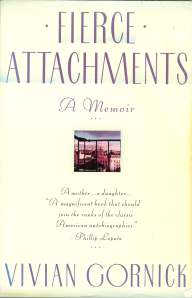-
fierce attachments: difficult mothers and the daughters who love them
A few years ago I was at an all women dinner party and we started talking about our mothers. Because it’s Marin County — an area saturated with shrinks of all stripes — there was a lot of shrinkish vocabulary circulating the room. At one point when I talked about my mother and my complicated relationship with her, one of the women said, “She must have been a narcissist.” No, I said, she was not a narcissist and I tried to back up my claim with examples of her non-narcissistic behavior. Another woman opined that my mother must have had boundary issues. Yet another, diagnosed her as borderline. I changed the subject. These terms, as applied to someone I cared about, were not only off the mark, they were offensive. Where, I thought, is a novelist when you need one?
And this brings me to Vivian Gornick and her book, Fierce Attachments, a memoir structured around her walks with her aged mother in New York City and after which we named this web site. Gornick is not a novelist and it is not a work of fiction – I’ll get to that issue in a minute — but if you’ve read it, try to imagine someone affixing Gornick’s mother – an exasperating woman who could be petty and narrow-minded but who was also smart, courageous, and funny – with a label from the Diagnostic and Statistical Manual. Imagine how much of the power and the intensity would be lost.
Last year my husband and I were in France and we visited a couple we had recently met through mutual friends in California. They live in a gorgeously restored 19th century stone house. When I was poking around I discovered the salon (living room) that was not in use because it was filled to the rafters with cardboard boxes. Our hostess — I’ll call her Juliette — came along as I was peaking in the room so I asked her whose boxes they were. She said it was all her mother’s belongings and though she had died two years before, Juliette couldn’t face sorting and purging her mother’s stuff. I had heard from our mutual friend that the mother’s craziness had made Juliette’s life miserable, especially in her last few years. But that day in her salon, Juliette didn’t use the word crazy. Scanning the room, she said, “My mother was difficult.” She looked out the beveled glass window overlooking her garden and then back at me, her eyes brimming, and said, “But there was love.” Maybe you had to be there to see her wistful expression but it is the one and only time I remember the passive voice packing such a punch.
A few years ago Vivian Gornick got into a bit of trouble with the journalistic crowd for admitting in a talk on writing memoir at Goucher College that Fierce Attachments was not literally true at every turn. She compressed, she molded, she crafted, she created. This acknowledgment touched off a minor storm. A small group of critics cried deception. If it’s not strictly factual, they said, you can’t call it memoir. I have no patience with this criticism. She wasn’t posing as a drug addict so her book would be more commercial and catch Oprah’s attention. Anyone who’s read the book knows that while Gornick may have altered dates and blended events, she didn’t fabricate the emotional truth. I suspect that had she limited herself to the literal truth, she might not have gotten to that truth.
Along with a vivid portrait of her prickly self, her difficult mother and their bitter struggle with each other, she captured their hearts. Because, indeed, “there was love.”





